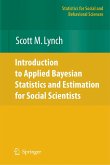How do we measure happiness? Focusing on subjective measures as a proxy for welfare and well-being, this book finds ways to do that. Subjective measures have been used by psychologists, sociologists, political scientists, and, more recently, economists to answer a variety of scientifically and politically relevant questions. Van Praag, a pioneer in this field since 1971, and Ferrer-i-Carbonell present in this book a generally applicable methodology for the analysis of subjective
satisfaction. Drawing on a range of surveys on people's satisfaction with their jobs, income, housing, marriages, and government policy, among other areas of life, this book shows how satisfaction with life "as a whole" is an aggregate of these domain satisfactions. Using German, British, Dutch, and
Russian data, the authors cover a wide range of topics, even some not usually considered part of economic study.
The book makes a distinction between actual satisfaction levels and individual norms, and in this way complements Van Praag's earlier work within the Leyden School with his later work in "happiness research". Among the many topics covered, the authors discuss: individuals' memory and anticipation processes and the estimation of adaptation phenomena (how individuals adapt to changing circumstances); the effect of reference groups on income norms and satisfaction with income; the importance of
climate for well-being, including the development of a climate-equivalence index; the trade-offs between chronic diseases and income when well-being is kept constant; the damage of aircraft noise on well-being; the construction of a new talent tax tariff; and inequality from a satisfaction perspective,
including the definition of "satisfaction inequalities", a natural extension of income inequality and poverty.
This groundbreaking book presents new and fruitful methodology that consitutes a welcome addition to the social sciences.
Hinweis: Dieser Artikel kann nur an eine deutsche Lieferadresse ausgeliefert werden.
satisfaction. Drawing on a range of surveys on people's satisfaction with their jobs, income, housing, marriages, and government policy, among other areas of life, this book shows how satisfaction with life "as a whole" is an aggregate of these domain satisfactions. Using German, British, Dutch, and
Russian data, the authors cover a wide range of topics, even some not usually considered part of economic study.
The book makes a distinction between actual satisfaction levels and individual norms, and in this way complements Van Praag's earlier work within the Leyden School with his later work in "happiness research". Among the many topics covered, the authors discuss: individuals' memory and anticipation processes and the estimation of adaptation phenomena (how individuals adapt to changing circumstances); the effect of reference groups on income norms and satisfaction with income; the importance of
climate for well-being, including the development of a climate-equivalence index; the trade-offs between chronic diseases and income when well-being is kept constant; the damage of aircraft noise on well-being; the construction of a new talent tax tariff; and inequality from a satisfaction perspective,
including the definition of "satisfaction inequalities", a natural extension of income inequality and poverty.
This groundbreaking book presents new and fruitful methodology that consitutes a welcome addition to the social sciences.
Hinweis: Dieser Artikel kann nur an eine deutsche Lieferadresse ausgeliefert werden.








